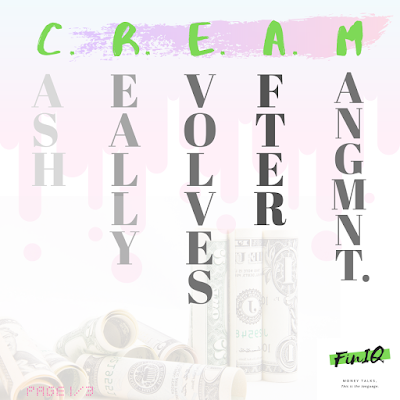C.R.E.A.M - Cash Really Evolves After Management
Income, Assets, Expenses and Liabilities are
the 4 major aspects of your cash flow.
Income
Working for money is a very common thing to do. Some persons
develop lucrative high-income skills that can afford them a luxurious lifestyle
while, on the other hand, the majority work ordinary 9 to 5 jobs that
allow them to make ends meet and sometimes have little change left over.
Picking up a second job is always a common alternative to
immediately doubling or tripling your active income, but the downside is the
exhaustion and social life suicide that follows. If applied correctly,
this can be beneficial down the road, but sadly a lot of people do
this just to pay bills. An alternative to this is to start a business to create
active income but the best part is that you can turn this into a passive income
source once the business has grown.
Assets
Expenses
Liabilities
The goal is to turn active income into passive
income so that you can live this lifestyle WITHOUT having to work! Granted,
your active income must be substantial if you can afford this lifestyle but you
are not creating financial freedom for yourself.
Now this brings up another question, "What if your income can't support
this lifestyle but you live it anyway?" You are using credit to live in
luxury. And if you are doing this, just know that you are making a terrible
mistake because not only are you NOT building assets but you are now
burying yourself in debt. Example: If you borrow $10,000 to go on a summer
vacation, you won’t end up actually spending $10,000.00 on vacation. If we
assume the loan has a rate of 16% over a course of 6 years, you will pay back
and additional $5,618.13! Doesn't sound like such a good idea now
that I've turned the interest rate and the life of the loan into a figure,
right? You wouldn't even realize that your future cash flow is
suffering from this. Also, the bank isn't stealing from you in this case
because you actually agreed to these terms when you sign the loan
agreement. Now, I don't want you to be mistaken here, there is nothing wrong
with living in luxury but ask yourself, "Can your assets finance that
luxurious lifestyle?" If not then you may want to build up some more
assets before you start feeling yourself.
Managing your cash flow isn't hard and I'll break it
down for you below:
(I would recommend using an app or excel spreadsheet to track everything. Writing everything down is tedious and, lets admit it, outdated.)
I'll leave you with this quote from a Youtube channel called
FightMediocrity. The quote comes from a video where he summarized the book Rich
Dad Poor Dad.
"The poor only have expenses, the rich buy assets and the
middle class buy liabilities that they think are assets."
Shout out to Wu-Tang for this bop but they
have it backwards! You're going to need to learn how to rule all of the cash
around you instead of the other way around. Cash flow management is the most
effective skill that you can learn in your personal finances and is the key to
financial freedom.
Income, Assets, Expenses and Liabilities are
the 4 major aspects of your cash flow.
Income is your cash inflow and
it can be broken down into two categories; active income and passive income.
Either way, you're getting paid, but they both have two completely different
strategies. Active income is where you use your time and energy to get paid (boooo!),
but passive income is where you use your money to get paid (yayyyyy!).
Working for money is a very common thing to do. Some persons
develop lucrative high-income skills that can afford them a luxurious lifestyle
while, on the other hand, the majority work ordinary 9 to 5 jobs that
allow them to make ends meet and sometimes have little change left over.
Picking up a second job is always a common alternative to
immediately doubling or tripling your active income, but the downside is the
exhaustion and social life suicide that follows. If applied correctly,
this can be beneficial down the road, but sadly a lot of people do
this just to pay bills. An alternative to this is to start a business to create
active income but the best part is that you can turn this into a passive income
source once the business has grown.
“Getting your money to work for you”, you hear it often, don't
you? Well, unlike people, money actually likes to work for you and the
more of it you have the more of it you can employ. You can invest in things like
stocks that can pay dividends, bonds & preference shares that pay interest,
businesses that can make profits and rental properties (commercial or
residential) that can pay rental income. Now, here is the catch, all of these
forms of passive income come from acquiring assets, and unless you inherit
a large sum of cash or win the lottery (NOT ENCOURAGING GAMBLING, just saying), you will have to use active
income to acquire such assets.
They say that everything comes at an expense, and boy they were
right (whoever 'they' are). Cash outflow is just something we all have to deal
with, whether we’re rich or poor. Most people will tell you to live below your
means but this is only a temporary plan if you are working to
accomplish a larger financial goal. It is effective, but is it a good long-term
strategy? I don't think so. Living within your means is a much more realistic
way of managing your finances without looking, feeling or acting like a
cheapskate. Unfortunately, most persons operate from neither of these positions
because living below or within your means is simply an acceptable condition
(satire intended). The luxury of living above your means is one that no
one can ever afford but so many people actually do it. Though, I can understand
why. It is because we live in a world where we are all Thanos and we can
get so many things at the snap of a finger. Simply put, looking rich
now is more attractive than actually being rich later.
So, I'll paint a picture. You have a very lucrative high-income
job that you love. You're living in a big house, driving a Beamer & a
G-Wagon, you took vacation to Bali last year & plan to go to Italy this
year. All of what you’ve done was paid for in cash. You've made
it for sure, haven't you? Well... Not exactly. Based on these purchases, it
only looks like you've made it. This is why a lot of professional
athletes, actors, performers and lottery winners (AGAIN, I'M NOT PROMOTING GAMBLING, just saying) go broke. The issue here is that you aren't acquiring any assets.
You are spending all of your active income on leisure and luxuries which might
have a 0.0000000000001% monetary return if you're lucky. Unfortunately, you
are accumulating liabilities but no assets. And I know what
you're thinking, "But my house is an asset." Nope. It is true
that real estate can be an asset but when you occupy the entire space
it is only an expense to you and it does not provide any income.
The goal is to turn active income into passive
income so that you can live this lifestyle WITHOUT having to work! Granted,
your active income must be substantial if you can afford this lifestyle but you
are not creating financial freedom for yourself.
Now this brings up another question, "What if your income can't support
this lifestyle but you live it anyway?" You are using credit to live in
luxury. And if you are doing this, just know that you are making a terrible
mistake because not only are you NOT building assets but you are now
burying yourself in debt. Example: If you borrow $10,000 to go on a summer
vacation, you won’t end up actually spending $10,000.00 on vacation. If we
assume the loan has a rate of 16% over a course of 6 years, you will pay back
and additional $5,618.13! Doesn't sound like such a good idea now
that I've turned the interest rate and the life of the loan into a figure,
right? You wouldn't even realize that your future cash flow is
suffering from this. Also, the bank isn't stealing from you in this case
because you actually agreed to these terms when you sign the loan
agreement. Now, I don't want you to be mistaken here, there is nothing wrong
with living in luxury but ask yourself, "Can your assets finance that
luxurious lifestyle?" If not then you may want to build up some more
assets before you start feeling yourself.



Comments
Post a Comment